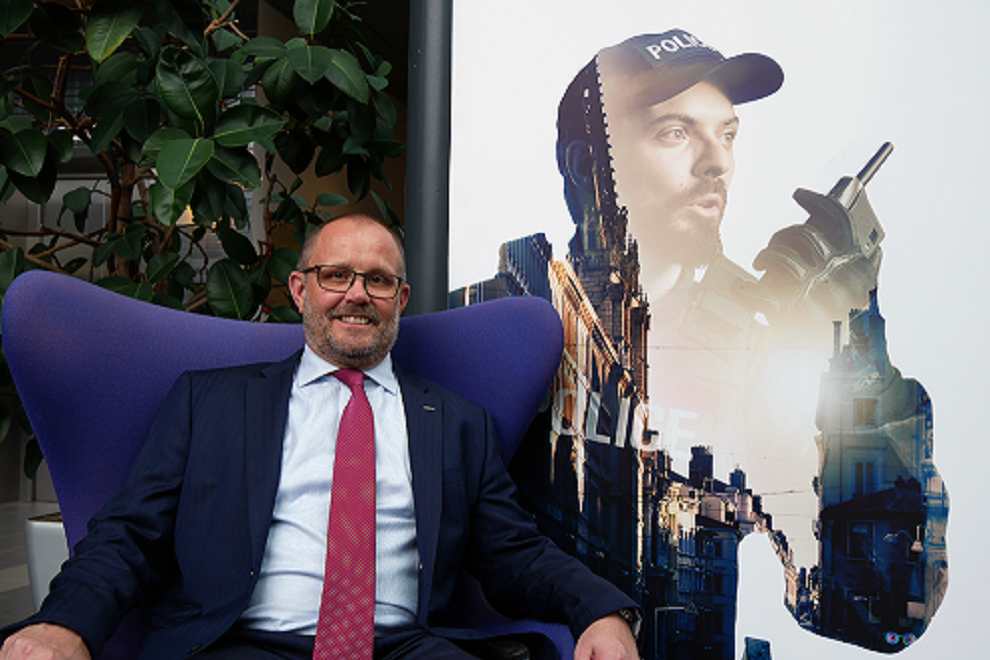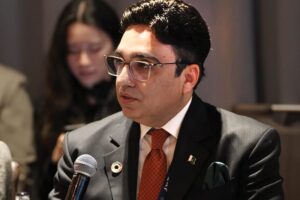Andrew Forbes, Head of MENA region for Secure Land Communications at Airbus
Interview: Khalid Athar
Khalid Athar: What solutions is Airbus offering to minimize risks when organizations introduce mission-critical broadband?
Andrew Forbes: Public safety and other professional organizations around the world want mobile broadband to be part of their communications. Implementing mission-critical broadband is complex, and the need to change operational processes accordingly is crucial.
According to Public Safety Technologies Report 2019 by IHS Markit, the estimated compound annual growth rate (CAGR) of public safety personnel in 2018-2023 is 1% globally and 0% in Europe. This means that the public safety service organisations are expected to achieve greater results with few additional resources. Therefore, public safety organizations need to work more efficiently and effectively to deliver better safety and security, but without additional personnel. New technology could effectively be one of the solutions in this case.
Airbus Hybrid solutions such as Tactitlon Dabat and Tactilon Agnet enable a seamless evolution to existing radio communications, providing instant group communications, mission-critical availability and reliability, multiple security features, and clear audio and video capabilities proving to be vital in supporting the work of public safety professionals.
KA: Please explain the use of Tactilon Dabat in critical connectivity. Secure communication is a concern of everyone.
AF: Airbus’s Tactilon Dabat is the world’s first smartphone and full Tetra radio in one device. The Tactilon Dabat is a smart, strong, and secure device for public safety and mission-critical users. Android features and a special design for radio use, make Tactilon Dabat help organizations to save time, money, resources – and even lives.
The device itself has all the communication tools necessary for mission-critical communications. With advanced applications supported by Tactilon Dabat, built-in security and broadband data at their fingertips, along with identity checking complete with database lookup, map apps, messaging and secure group communication, and security professionals have all the tools they require to ensure maximum efficiency and seamless operations in an emergency. Airbus’s Tactilon Dabat also supports different applications, which enable a good integration and additional new services in vehicle installations.
Advanced PTT brings advanced technological improvements for both security and emergency personnel, providing them with enhanced audio quality, which translates to clear instructions and requests. With Push to Talk, users are able to send videos and images to improve clarity in communication, and their devices integrated with IoT sensors, which can notify workers about potential equipment failures, allowing them to begin maintenance prior to the unplanned downtime. This technology can run on smart devices, and used without training.
Even though this technology brings several enhancements, integrating it with PMR and running it in a hybrid environment can bring many additional benefits. These include improved collaboration with wider teams, higher responsiveness and easier decision making as all personnel can be reached at once.
In a hybrid environment, the standard communications set-up will serve valuable functions that cannot be immediately replicated by advanced PTT, or contain unique, mission-critical features.
For a successful deployment and reliable operations, an experienced systems integrator or an end-to-end solution provider should be selected, as they understand both critical communications and reliability engineering.
KA: Please talk about Tetra and 4G/5G, both together, and separately.
AF: There is a lot of talk about Tetra and 4G/5G, both together and separately. With the advent of 4G/5G technology, many people think that Tetra technology will be obsolete. But both have their benefits, and combining them brings increased innovation in services.
Since both technologies have their advantages, Airbus has created a pioneer hybrid device that is both a Tetra radio, and a smartphone in one. With Airbus’s Tactilon Dabat users can opt for a single, hybrid device which can switch between use of Tetra and 4G/5G for their operations, when, and where need be.
For users requiring both technologies the switchover needs to be seamless and automatic. Roaming between the Tetra and 4G/5G networks needs to be performed instantly and automatically by their hybrid device.
The Tactilon Dabat provides these functions and keeps users connected, while also increasing the area coverage. Tactilon Dabat’s Hybrid roaming feature is the bridge between Tetra and broadband 4G/5G. It is one of the best examples of how well 4G/5G and Tetra networks can work together with a hybrid device and an application, Tactilon Agnet.
KA: Do you see any rise in the market demand for critical communication in the MENA region?
AF: The Middle East has always been on the forefront to embrace new technologies. It is a place in constant improvement as communities are rapidly growing and expanding, more and more people are flocking towards the region for opportunities. A quick look around the country, one can see the pace of development as new towers are being built and cities are growing. Thus, the Middle East requires more and more technologies to make citizens’ lives easier, and for mission critical professionals to do their job more efficiently.
The region is very advanced in terms of homeland security and communication technologies. It is home to some of the most advanced smart cities. As a matter of fact, the region as a whole is pushing towards extremely integrated and innovative solutions. To demonstrate this, some of our key innovations and latest products were actually born and developed together with our customers in the region – like Tactilon Dabat. The region is a trailblazer in many areas, and we are proud to be part of this evolution and active in the Middle East’s critical communications market evolution since the 1970s.












